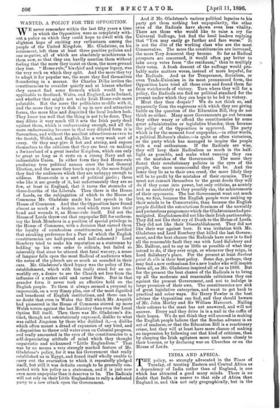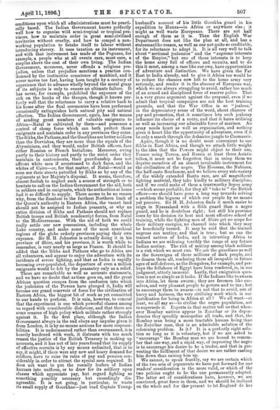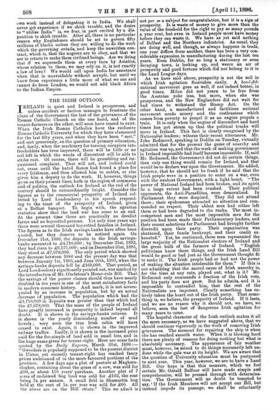INDIA AND AFRICA.
T"policy, so strongly advocated in the Times of Tuesday, of treating Eastern and Central Africa as a dependency of India rather than of England, is one which has attracted a good many minds. There is no doubt that India is nearer to that side of Africa than England is, and this not only geographically, but in the conditions upon which all administrations must be practi- cally based. The Indian Government knows perfectly well how to organise wild semi-tropical or tropical pro- vinces, how to maintain order in great semi-civilised territories without cruelty, and how to compel a non- working population to betake itself to labour without introducing slavery. It uses taxation as its instrument, and with that instrument has made of the Peguans, for example, a people who at all events earn, must earn, a surplus above the cost of their own living. The Indian Government, moreover, never offends a religious pre- judice, unless that prejudice sanctions a practice con- demned by the instinctive conscience of mankind, and it never moves too fast, having been taught by a century of experience that to advance wholly beyond the moral grasp of its subjects is only to ensure an ultimate failure. It has never, for example, prohibited the exposure of the sick on the banks of the Ganges, though it knows per- fectly well that the reluctance to carry a relative back to his home after the final ceremonies have been performed occasionally extinguishes both natural pity and natural affection. The Indian Government, again, has the means of sending great numbers of valuable emigrants to Africa—Natal is cultivated by them—and possesses a control of cheap force which can both protect those emigrants and maintain order in any provinces they enter. The Sikhs, the Pathans, and the Goorkhas are better soldiers than the Dervishes, they are more than the equals of the Abyssinians, and they would, under British officers, face either Russian or French battalions. Moreover, owing partly to their history and partly to the strict order they maintain in cantonments, their guardianship does not affront white men if accustomed to dark faces, and the whites of Cairo—or, for that matter, of Natal—would as soon see their streets patrolled by Sikhs as by any of the regiments at her Majesty's disposal. It seems, therefore, almost foolish to neglect such a source of strength or to hesitate to call on the Indian Government for the aid, both in soldiers and in emigrants, which the authorities at home find it so difficult to supply. There seems to be no reason why, from the Zambesi to the furthest Northern limit of the Queen's authority in Eastern Africa, the vacant land should not be assigned to Indian peasants, or why an entire division of Sikhs and Pathans should not replace British troops and British nondescript forces, from Natal to the Mediterranean. With the aid of both we could really settle our new possessions including the whole Lake country, and make some of the most anarchical regions of the globe orderly provinces paying their own expenses. Sir H. B. Johnston is actually doing it in his province of Shire, and his province, it is worth while to remember, is very nearly as large as France. It should be added that the Sikhs and Pathans who go to Africa are all volunteers, and appear to enjoy the adventure with its incidents of severe fighting, and that as India is rapidly becoming over-populated, the departure of even a, million emigrants would be felt by the peasantry only as a relief. These are remarkable as well as accurate statements, and we have no doubt that as time goes on, and the great African question escapes from the confusion into which the jealousies of the Powers have plunged it, India will become our grand reservoir of force for the civilisation of Eastern Africa, the biggest bit of work as yet committed to our hands to perform. It is vain, however, to conceal that the experiment is one which powerful classes among us regard with considerable disfavour, and that there are some reasons of high policy which militate rather strongly against it. In the first place, although the Indian Government always in the end obeys any impulse given it from London, it is by no means anxious for more responsi- bilities. It is undermanned rather than overmanned, it is heavily burdened with work, it distrusts with too much reason the justice of the British Treasury in making up accounts, and it has not of late years found that its supply of effective recruits is by any means unlimited, that is to say, it might, if there were any new and heavy demand for soldiers, have to raise its rates of pay and pension con- siderably in order to attract the special men required. It does not want to put the rascally loafers of Indian bazaars into uniform, or to draw for its soldiery upon classes which appreciate pay, but regard fighting as something possibly necessary but exceedingly dis- agreeable. It is not going, in particular, to waste its small supply of Goorkhas—just read Captain Young. husband's account of his little Goorkha guard in his expedition to Hunza—in Africa or anywhere else ; it might as well waste Europeans. There are not half enough of them as it is. Then the English War Department does not like the plan at all, and has a statesmanlike reason, as well as one not quite so creditable, for its reluctance to adopt it. It is all very well to talk about "sectional jealousies" and the "supreme interests of the Empire," but one of those interests is to keep the home army full of officers and recruits, and to do this it must, among a race like our own, have opportunities of adventure and distinction. We have given the Far East to India already, and to give it Africa too would be to reduce the chances now left to the home army very seriously, and render it in the absence of European war, which we are always struggling to avoid, rather too much of an armed and disciplined force of reserve police. That is a very grave argument against the proposal, even if we admit that tropical campaigns are not the best training grounds, and that the War Office is so "jealous," in the depreciatory sense of the word, about chances of pay and promotion, that it sometimes lets such jealousy influence its choice of a route, and that it hates utilising as well as increasing our admirable force of marines. An army needs heart as well as organisation, and nothing gives it heart like the opportunity of adventure, even if it be only a march through the Ashantee jungle to Coomassie.
Again, though it is no doubt most convenient to use Sikhs in East Africa, and though we attach little weight to the idea that the Powers might object to their use, France using Turcos, and Russia at least three Asiatic tribes, it must not be forgotten that in using them we deprive ourselves of an almost invaluable instrument for the civilisation of the negro. The Reneges, the Nubians, the half-caste Soudanese, and we believe every sub-variety of the widely extended Bantu race, are all magnificent fighting material, they take kindly to military discipline, and if we could make of them a trustworthy Sepoy army —which seems probable, for they all "take to" the British officer—we should have gone a long way towards solving a problem the bigness of which our people by no means yet perceive. Sir H. H. Johnston finds it much easier to reign in Nyassaland with a Sikh guard than a negro guard, and he is doubtless right ; but still his province loses by his decision its best and most effective school of training, while the fighting men of Shire get no scope for their military energies, no channel into which they may be beneficially turned. It may be said that the trained negroes can mutiny, and that is true ; but so can the trained natives of India, and in intrusting Africa to Indians we are widening terribly the range of any futuro Indian mutiny. The risk of mutiny among black soldiers is a risk which we must run. We are the guardians as well as the Sovereigns of these millions of dark people, and to disarm them all, rendering them all incapable in future ages of self-defence, as the Bengalees, for example, and per- haps the fellaheen of Egypt have been rendered, is, in our judgment, utterly immoral. Lastly, that emigration ques- tion is not so simple as it looks. If the Indians like to swarm into Africa, let them swarm ; they are freemen like our- selves, and very pleasant people to govern and to tax ; but to encourage them to swarm—is not that to avoid, out of hurry and laziness, the very civilising work which is our justification for being in Africa at all ? We all want—at least, we all say so—to civilise the negro population, not to supersede it. Experts in that matter tell us that when- ever Bombay natives appear in Zanzibar or its depen- dencies they speedily monopolise all trade, and that, the Bombay man being a more tractable human being than the Zanzibar man, that is an admirable solution of the colonising problem. Is it P It is a perfectly right solu- tion so long as it is voluntary, but if we are asked to " encourage " the Bombay man we are bound to remem- ber that one way, and a rapid way, of improving the negro- is to encourage his desire to be a trader, and that in pre- venting the fulfilment of that desire we are rather casting him down than raising him up.
We cannot, to speak frankly, say we are certain which of the two sets of arguments we have put forward for our readers' consideration is the more valid, or which of the two policies ought to be the one permanently adopted. The latter set of considerations have, however, we are convinced, great force in them, and we should be inclined on the whole and for the- present to let England do her own work instead of delegating it to India. We shall never get experience if we shirk trouble, and the desire to "utilise India" is, we fear, in part excited by a dis- position to shirk trouble. After all, there is no particular reason why Englishmen should be set to govern fifty millions of blacks unless they are willing to do the work which the governing entails, and keep the unwritten con- tract, which is, that the negroes are to obey, and that we are in return to make them civilised beings. Are we doing that if we supersede them at every turn by Asiatics, whose relation to them, we may rely on it, is not exactly a law of love? We would call upon India for assistance when that is unavoidable without scruple, but until we know from experience a little more of what we can and cannot do from London, we would not add black Africa to the Indian Empire.




































 Previous page
Previous page